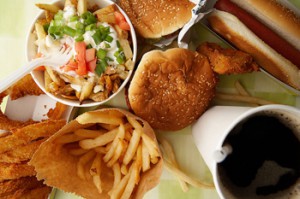Podcast: Play in new window
BOB HIRSHON (host):
A gut reaction to a high-fat diet. I’m Bob Hirshon and this is Science Update.

A molecule in the gut may help prevent overeating. This according to Yale University psychiatrist Ivan de Araujo. In the past, his team found that when mice were fed a high-calorie diet, their brain’s pleasure response to food got weaker – and perhaps to compensate, the mice ate more and more. The overfed mice also became deficient in a gut molecule called OEA. In a new study, they found that restoring OEA to the gut reined in the overeating, and even revived the mice’s interest in healthier, lower-calorie foods.
IVAN DE ARAUJO (Yale University/John B. Pierce Laboratory):
Usually these animals show very low interest in consuming anything that contains very low levels of calories.
HIRSHON:
Their brains’ reaction to calories also returned to near-normal levels. The findings may point to new ways to manage overeating and obesity. I’m Bob Hirshon for AAAS, the Science Society.
